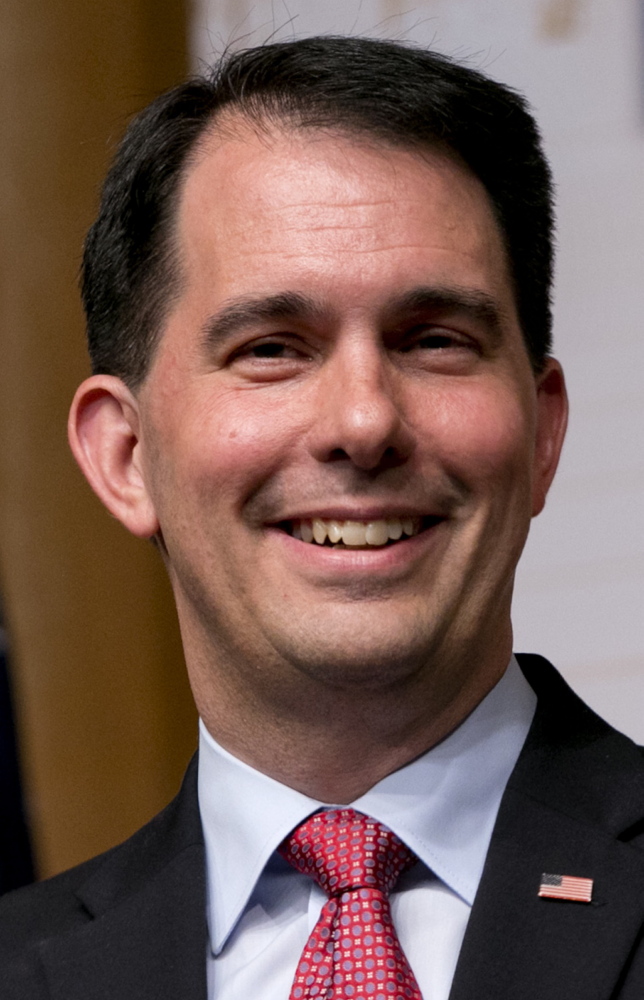MADISON, Wis. — When Gov. Scott Walker launches his presidential campaign Monday, he will pitch himself as a penny-pinching fiscal hawk who wants lower taxes, cuts in government spending and less government assistance.
But for months here in the state capital, Walker has pushed hard to use $250 million in taxpayer money to pay for a new professional basketball arena for the Milwaukee Bucks – confusing and angering the fiscal conservatives who usually support him.
“The stark political reality is that the proposal is a $250 million taxpayer subsidy for the Bucks and their billionaire owners in a budget rife with cuts for other programs,” Charlie Sykes, a popular and influential conservative radio show host in Milwaukee, wrote in a column listing 10 reasons the deal “is a hot mess.”
The proposal nearly derailed passage of Walker’s two-year state budget and is just one in a series of chaotic local controversies that he has had to navigate as he prepares to officially launch a national presidential campaign.
Dealing with legislation at home was supposed to be the low-drama part of Walker’s year. Instead, things in Madison have been in turmoil for months – a complication for a governor building his presidential candidacy around his ability to get things done. Walker has spent much of the year feuding not only with Democrats – a fight he relishes – but also with fellow Republicans over proposals such as the Bucks’ arena.
Republican lawmakers who used to work with him in lock step are now questioning his budget priorities. Walker’s popularity has also fallen statewide, even as he pulls to the front of the crowded Republican presidential field nationally. Democrats, meanwhile, accuse Walker of using the budget and other issues to bolster his national 2016 run.
“It was put together by the governor to help his presidential prospects with the most far-right-wing group of his party, and it reflects those values perfectly,” state Rep. Andy Jorgensen, a Democrat from Milton, said at a news conference last week. “I suspect that’s why he’s leading in Iowa. He’s at the top of the polls there . . . but in Wisconsin, meanwhile, he’s at 41 percent approval.”
Walker introduced his two-year budget – dubbed “Our Freedom and Prosperity Proposal” – in a speech in early February that sounded more like an audition for president than a fiscal road map.
He promised to “help restore that American Dream right here in Wisconsin” by continuing to lower property taxes, freeze college tuition, consolidate economic development operations and reduce the size of the state government.
For months, Walker confidently said he would not launch his presidential campaign until completing the budget, which he expected to do in June. Instead, lawmakers spent most of the month deadlocked.
There wasn’t enough cash to pay for everything they wanted to do, partly the result of increasing costs, $2 billion in tax breaks since Walker took office and a stalled economy.
And with Walker exerting less influence, other Republicans have been jockeying for power and leverage. For a month, Republican leaders canceled all public budget meetings and instead met behind closed doors. Meanwhile, Walker loosened the timing of his presidential announcement, saying it’s not unusual for the budget process to drag on for so long.
The budget finally passed late Wednesday – saving Walker from embarrassment but giving him only a few days to review it and make vetoes.
Send questions/comments to the editors.



Success. Please wait for the page to reload. If the page does not reload within 5 seconds, please refresh the page.
Enter your email and password to access comments.
Hi, to comment on stories you must . This profile is in addition to your subscription and website login.
Already have a commenting profile? .
Invalid username/password.
Please check your email to confirm and complete your registration.
Only subscribers are eligible to post comments. Please subscribe or login first for digital access. Here’s why.
Use the form below to reset your password. When you've submitted your account email, we will send an email with a reset code.